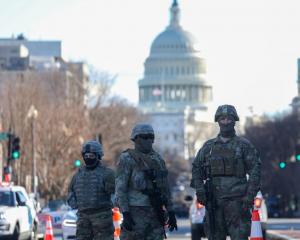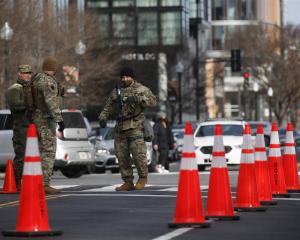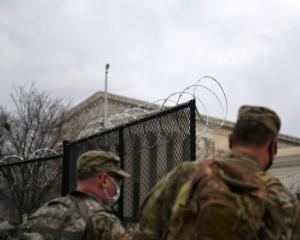
The Senate voted 56-44 on Tuesday to proceed with its trial of the former president, a historic first, rejecting largely along party lines his defence lawyers' argument that a president cannot face trial after leaving the White House. Democrats hope to disqualify Trump from ever again holding public office.
The video presented by the team of nine House of Representatives Democrats interspersed images of the January 6 Capitol violence with clips of Trump's incendiary speech to a crowd of supporters moments earlier urging them to "fight like hell" to overturn his November 3 election defeat.
Senators, serving as jurors, watched as screens showed Trump's followers throwing down barriers and hitting police officers at the Capitol. The video also included the moment when police guarding the House chamber fatally shot protester Ashli Babbitt, one of five people including a police officer who died in the rampage.
The mob attacked police, sent lawmakers scrambling for safety and interrupted the formal congressional certification of President Joe Biden's victory after Trump had spent two months challenging the election results based on false claims of widespread voting fraud.
"If that's not an impeachment offense, then there is no such thing," Democratic Representative Jamie Raskin, who led the prosecution, told the assembled senators after showing the video.
He wept as he recounted how relatives he brought to the Capitol that day to witness the election certification had to shelter in an office near the House floor, saying: "They thought they were going to die."
In contrast to the Democrats' emotional presentation, Trump's lawyers attacked the process, arguing that the proceeding was an unconstitutional, partisan effort to close off Trump's political future even after he had already departed the White House.
"What they really want to accomplish here in the name of the Constitution is to bar Donald Trump from ever running for political office again, but this is an affront to the Constitution no matter who they target today," David Schoen, one of Trump's lawyers, told senators.
He denounced the "insatiable lust for impeachment" among Democrats before airing his own video, which stitched together clips of various Democratic lawmakers calling for Trump's impeachment going back to 2017.

CONVICTION UNLIKELY
Trump was impeached by the Democratic-led House on January 13 on a charge of inciting an insurrection, although his conviction remains unlikely.
Finding him guilty would require a two-thirds majority, meaning that at least 17 Republicans would need to join the Senate's 48 Democrats and two independents in voting against Trump, who remains his party's most powerful figure even out of office.
Trump is the only president to go on trial in the Senate after leaving office and the only one to be impeached twice. He is just the third president in US history to be impeached at all.
The trial was held with extraordinary security around the Capitol following the siege, including armed security forces and a perimeter of fencing and razor wire.
Trump's defense argued he was exercising his right to free speech under the Constitution's First Amendment when he addressed supporters before the Capitol attack.
"We can't possibly be suggesting that we punish people for political speech in this country," Bruce Castor, one of Trump's lawyers, said.
Castor said the storming of the Capitol "should be denounced in the most vigorous terms," but argued that "a small group of criminals," not Trump, were responsible for the violence.
Most legal experts have said it is constitutional to have an impeachment trial after an official has left office.
"Presidents can't inflame insurrection in their final weeks and then walk away like nothing happened. And yet that is the rule that President Trump asks you to adopt," Democratic Representative Joe Neguse told the senators.
Most of the senators at the trial were present in the Capitol on Jan. 6, when many lawmakers said they feared for their own safety.
Republican Senator Bill Cassidy called the Democrats' speeches "a very good opening." He joined six of his Republican colleagues in finding the proceeding constitutional, reversing his vote from the prior month.
"The arguments they gave were strong arguments," said Cassidy.
The trial could provide clues on the Republican Party's direction following Trump's tumultuous four-year presidency. Sharp divisions have emerged between Trump loyalists and those hoping to move the party in a new direction. Democrats for their part are concerned the trial could impede Biden's ability to swiftly advance an ambitious legislative agenda.
One year ago, the then-Republican-controlled Senate acquitted Trump on charges of obstructing Congress and abuse of power for pressuring Ukraine to launch an investigation into Biden and his son Hunter in 2019.













